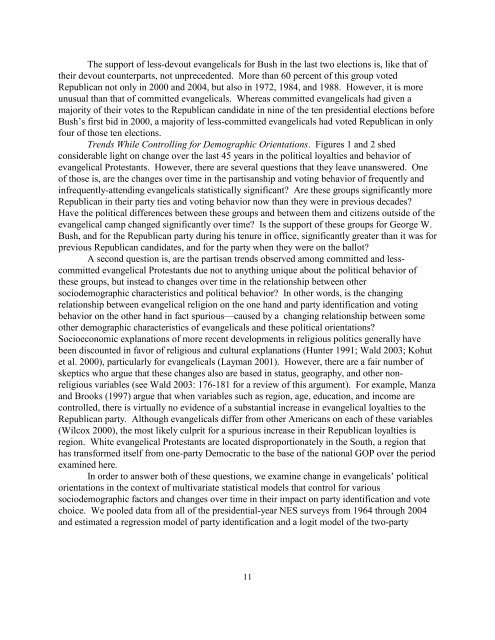George W Bush and the Evangelicals
George W. Bush and the Evangelicals: - Rooney Center - University ...
George W. Bush and the Evangelicals: - Rooney Center - University ...
- No tags were found...
You also want an ePaper? Increase the reach of your titles
YUMPU automatically turns print PDFs into web optimized ePapers that Google loves.
The support of less-devout evangelicals for <strong>Bush</strong> in <strong>the</strong> last two elections is, like that of<br />
<strong>the</strong>ir devout counterparts, not unprecedented. More than 60 percent of this group voted<br />
Republican not only in 2000 <strong>and</strong> 2004, but also in 1972, 1984, <strong>and</strong> 1988. However, it is more<br />
unusual than that of committed evangelicals. Whereas committed evangelicals had given a<br />
majority of <strong>the</strong>ir votes to <strong>the</strong> Republican c<strong>and</strong>idate in nine of <strong>the</strong> ten presidential elections before<br />
<strong>Bush</strong>’s first bid in 2000, a majority of less-committed evangelicals had voted Republican in only<br />
four of those ten elections.<br />
Trends While Controlling for Demographic Orientations. Figures 1 <strong>and</strong> 2 shed<br />
considerable light on change over <strong>the</strong> last 45 years in <strong>the</strong> political loyalties <strong>and</strong> behavior of<br />
evangelical Protestants. However, <strong>the</strong>re are several questions that <strong>the</strong>y leave unanswered. One<br />
of those is, are <strong>the</strong> changes over time in <strong>the</strong> partisanship <strong>and</strong> voting behavior of frequently <strong>and</strong><br />
infrequently-attending evangelicals statistically significant? Are <strong>the</strong>se groups significantly more<br />
Republican in <strong>the</strong>ir party ties <strong>and</strong> voting behavior now than <strong>the</strong>y were in previous decades?<br />
Have <strong>the</strong> political differences between <strong>the</strong>se groups <strong>and</strong> between <strong>the</strong>m <strong>and</strong> citizens outside of <strong>the</strong><br />
evangelical camp changed significantly over time? Is <strong>the</strong> support of <strong>the</strong>se groups for <strong>George</strong> W.<br />
<strong>Bush</strong>, <strong>and</strong> for <strong>the</strong> Republican party during his tenure in office, significantly greater than it was for<br />
previous Republican c<strong>and</strong>idates, <strong>and</strong> for <strong>the</strong> party when <strong>the</strong>y were on <strong>the</strong> ballot?<br />
A second question is, are <strong>the</strong> partisan trends observed among committed <strong>and</strong> lesscommitted<br />
evangelical Protestants due not to anything unique about <strong>the</strong> political behavior of<br />
<strong>the</strong>se groups, but instead to changes over time in <strong>the</strong> relationship between o<strong>the</strong>r<br />
sociodemographic characteristics <strong>and</strong> political behavior? In o<strong>the</strong>r words, is <strong>the</strong> changing<br />
relationship between evangelical religion on <strong>the</strong> one h<strong>and</strong> <strong>and</strong> party identification <strong>and</strong> voting<br />
behavior on <strong>the</strong> o<strong>the</strong>r h<strong>and</strong> in fact spurious—caused by a changing relationship between some<br />
o<strong>the</strong>r demographic characteristics of evangelicals <strong>and</strong> <strong>the</strong>se political orientations?<br />
Socioeconomic explanations of more recent developments in religious politics generally have<br />
been discounted in favor of religious <strong>and</strong> cultural explanations (Hunter 1991; Wald 2003; Kohut<br />
et al. 2000), particularly for evangelicals (Layman 2001). However, <strong>the</strong>re are a fair number of<br />
skeptics who argue that <strong>the</strong>se changes also are based in status, geography, <strong>and</strong> o<strong>the</strong>r nonreligious<br />
variables (see Wald 2003: 176-181 for a review of this argument). For example, Manza<br />
<strong>and</strong> Brooks (1997) argue that when variables such as region, age, education, <strong>and</strong> income are<br />
controlled, <strong>the</strong>re is virtually no evidence of a substantial increase in evangelical loyalties to <strong>the</strong><br />
Republican party. Although evangelicals differ from o<strong>the</strong>r Americans on each of <strong>the</strong>se variables<br />
(Wilcox 2000), <strong>the</strong> most likely culprit for a spurious increase in <strong>the</strong>ir Republican loyalties is<br />
region. White evangelical Protestants are located disproportionately in <strong>the</strong> South, a region that<br />
has transformed itself from one-party Democratic to <strong>the</strong> base of <strong>the</strong> national GOP over <strong>the</strong> period<br />
examined here.<br />
In order to answer both of <strong>the</strong>se questions, we examine change in evangelicals’ political<br />
orientations in <strong>the</strong> context of multivariate statistical models that control for various<br />
sociodemographic factors <strong>and</strong> changes over time in <strong>the</strong>ir impact on party identification <strong>and</strong> vote<br />
choice. We pooled data from all of <strong>the</strong> presidential-year NES surveys from 1964 through 2004<br />
<strong>and</strong> estimated a regression model of party identification <strong>and</strong> a logit model of <strong>the</strong> two-party<br />
11


